-
JAPAN CUTS July 26-August 6, 2023
Last edited by Chris Knipp; 08-21-2023 at 07:15 PM.
-
PLASTIC (Daisuke Miyazaki (2023)
DAISUKE MIYAZAKI: PLASTIC (2023)
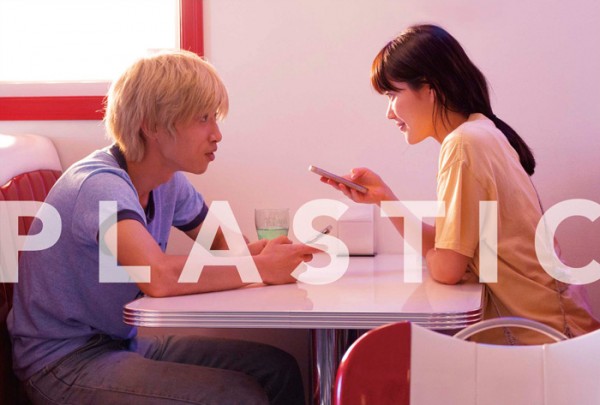
TAKUMA FUJIE, AN OGAWA IN PLASTIC
Youth, love-longing and a cult band
This charming, delicately melancholy film is extremely Japanese. Every conversation is a symphony of things half said or unsaid, and the more touching for it. This is about music, about dreams of fame, of fetishizing a cultish favorite band. It all revolves around two high schoolers, Ibuki (An Ogawa) and Jun (Takuma Fujie). Jun, with attention-getting long bleach-blond hair, is a guitarist. They are in Nagoya. He has just come from Tokyo when they meet, after a bad experience. A band, seeking commercial success has sought to expel him, and his refusal to leave has led to a fight and expulsion from school.
Jun now lives with his grandfather, an old music fan in a hip T shirt with a lovely immaculate antique Fifties Jaguar, which he allows Jun to drive.
Ibuki has faith in him, and they quit high school and live together. It's not so much what happens, though, as how it happens. Plastic, Miyazaki's third film, is directly inspired by musician Kensuke Ide’s eclectic concept album "Contact from Exne Kedy and The Poltergeists," which imagines the existence of a fictional 70s glam rock band of the same name. The idea of a message sent out into space that takes 25,000 light years to get there becomes a metaphor for longing.
Was there anything behind Jun's grand schemes and boasts of being on the verge of recognition? Anyway, when he and Ibuki live together away from family support and he gets jobs that pay poorly, he has no time or inspiration for music. "Plastic" refers to a scheme Jun and a friend try to grow and sell those microorganisms or enzymes that reputedly consume plastic. At this point Jun loses the bleached hair for a while and it's slicked back and black.
Ibuki and Jun originally connected because both idolize Exne Kedy, a 70's glam rock band (invented based on Ide's concept album), and long for its return. Leaps through time lead to the breakup of Ibuki and Jun, and jump into covid, with a series of three sequences set in three Augusts in this period. They have broken up, but he thinks of her, and when he calls her, even late at night, she answers.
It's wonderful what rich material Miyazaki weaves from trifles. A particularly good scene shows Jun noodling on an electric guitar. He keeps setting it aside to text Ibuki, He calls her outside and mid-conversation says "Are you there, Ibuki?" And she says she is and asks, "Are you there, Jun?" Just "Hello?" seems like a declaration of love, or love-longing. An hour in, sudden news of Exne Kedy’s surprise 50-year reunion re-invigorates their connection.
In interview by Natalie Ng in Filmed in Ether with Miyazaki shows how he understands the themes Plastic delicately interweaves in this touching portrait of youth that shows "what it means to be young and confused, how the bands we love as young people shape us," and "music’s powerful ability to bring people together."
Kensuke Ide's music throughout helps define the film. The Luca Guadagnino of the TV series "We Are Who We Are" might like Plastic.
Plastic, 104 mins., premieres in Japan Cuts, New York. Showtimes:
Friday, July 28, 2023
9:00 pm Q&A with director Daisuke Miyazaki.
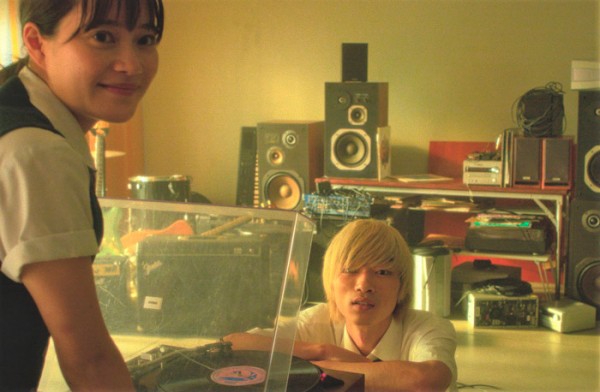
AN OGAWA, TAKUMA FUJIE IN PLASTIC
Last edited by Chris Knipp; 09-06-2023 at 12:55 AM.
-
BEST WISHES TO ALL みなに幸あれ (Yuta Shimotsu 2023)
YUTA SHIMOTSU: BEST WISHES TO ALL みなに幸あれ (2023)

Creeped out by her rural grandparents
Yuta Shimotsu's feature debut Best Wishes to All みなに幸あれ, a troubling, but ultimately disappointing puzzler, is about a Tokyo nursing student dedicated to doing good at every opportunity. We follow her on a break-time visit to her grandparents in a peaceful village setting. The grandparents seem sweet and very happy, but then odd things start to happen. Shimotsu provides a disturbingly weird J-horror-inspired first 30 minutes. I was genuinely unnerved by those scenes in the old folks' house. Unfortunately, things don't build or even connect very well in the scenes that make up the concluding fifty-five minutes.
It's not the fault of the actors. Everyone does their job competently, and Kotone Furukawa who won the Berlinale Silver Bear for her performance in the second segment of Hamaguchi's celebrated three-part Wheel of Fortune and Fantasy (2018), is fine in the lead. There is great use of the seemingly soothing and the mundane: the idyllic rural setting, the sweet, conventional grandparents, the grandparents' classic traditional Japanese house, all of which become the more disturbing because of how reassuring they seemed at first. The tech aspects and location shooting are fine. But there is a line between disturbingly weird and incoherent that is crossed - going in the wrong direction.
There's a concept here - in fact the film seems to get lost in it. Maybe it would have been better without one, because it seems to come in and out of focus, as does the "fantastic" element. The screenplay seems to have needed further work, or the filming of it needed more cinematic flair. The general idea is something about happiness, and whether you earn it through doing good or, well, being evil, e.g., by selectively tormenting others. ("What would you do for happiness?" is a slogan for the film.) There also seems to be a conspiracy of evil practices in the village world the protagonist is visiting - one that some young people baulk at joining in on, usually giving up and acting like everybody else in he end. Apparently this happens to the protagonist. But since at the end she has gone back to Tokyo and resumed her life as a nursing student, that's not clear.
There are also hints that the protagonist has been having disturbing flashbacks to earlier experiences - or may even be imagining a lot of this, since some moments certainly are only her mental "what-ifs." But that also isn't worked out forcefully enough to cohere; indeed further undercuts the coherence of what should be the film's main development section. Shimotsu and his co-writer Rumi Kakuta developed a great opening half hour and apparently didn't realize the rest needed more work. Unless your an offbeat Japanese horror-concept movie completest this film can't be recommended.
Best Wishes to All/aka Regards to All みなに幸あれ, 89 min., debuted at Shanghai Jun. 10, 2023, also showing at Bucheon fantastic festival July 1. Screened for this review as part of the NYC Japan Society festival Japan Cuts, where it was shown Thursday, July 27, 2023 at 9:00 pm. (North American premiere.)
Last edited by Chris Knipp; 07-31-2023 at 05:33 PM.
-
CONVENIENCE STORY コンビニエンス ストーリー (Satoshi Miki 2022)
SATOSHI MIKI: CONVENIENCE STORY コンビニエンス ストーリー (2022)
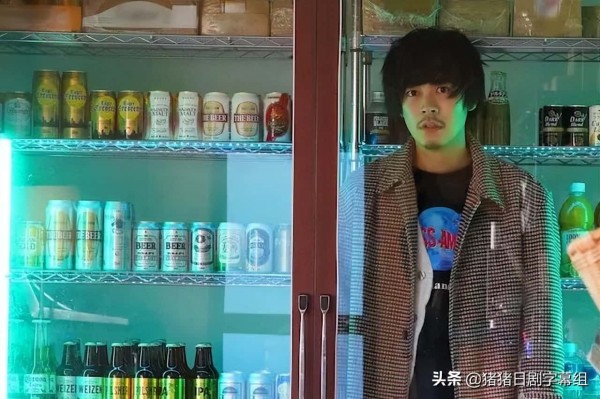
RYO NARITA IN CONVENIENCE STORY
Fantasy blends comedy, romance, whimsy, a touch of menace
In Convenience Story, Kato (Ryo Narita) is a cute, scruffy young screenwriter (with a rep of producing scripts for unoriginal 'male fantasy films'). (Note: he does have talent and facility, though he's a bit of a slacker, perhaps.) He lives with Zigzag (Yuki Katayama), an aspiring actress. While she is aceing an audition by reacting quickly to being "killed," Kato goes astray. He goes to great lengths to get their dog Cerberus a special dog food that comes in a jar, called "Weredog." But Cerberus sabotages his laptop, erasing all the text of the screenplay he is working on, which is due very soon. Understandably incensed, Kato tries to drive to a remote location to ditch the dog. But that night he goes back to search for the pet when Zigzag misses him. There he runs out of gas, and meets Keiko (Atsuko Maeda), the beautiful proprietress of a konbini (convenience store), who puts the make on him. By walking into the store, he has entered an alternate reality.
She lives with Nagumo (Seiji Rokkaku), an amiable eccentric, tall, cherubic, perhaps a touch dangerous, who dresses up in evening clothes and goes out into the woods to "conduct" symphonic music played by an "orchestra" of generator-powered loudspeakers, each of which has its own umbrella attached, in case of rain. Impressive to us and also to Kato, who visits, but declines to take the baton. Kato moves in temporarily at the living quarters adjoining the convenience store, whose cheap magazines give him ideas for screenplays. Kato and the Keiko make love in his stalled truck, within earshot of Nagumo's electronic forest orchestra. It seems unlikely that Nagumo is unaware of Kato and Keiko's dallying. They escape by taking the nearest bus, which goes to a hot springs and festival - but amid the festivities, Nagumo turns up, in a mask.
Luckily, It's all a dream. And yet while all this excitement is going on, Kato composes a successful screenplay! Convenience Story dabbles perhaps a bit too much in its pretty yellow, green, blue, and red color filters, and seems about to come to a standstill at times. But I found this fantasy amiable and diverting, an agreeable, human-scale example of analogue storytelling that's a relief after the overstuffed multiverses of movies like Everything, Everywhere.
This oddball material was inspired by veteran Japan Times film reviewer Mark Schilling, one of Miike's early champions, who proposed the convenience store theme and gets a co-writer credit as ah homage. According to Rouven Linnarz in Asian Movie Pulse Satoshi Miki, who has compared his work to Monty Python, is a director who's "made quite the impact" on Japanese comedy. He focuses on "odd or troublesome" aspects of the culture, which here seems to have been the ubiquitous twenty-four-hour convenience everything store. To an outsider Convenience Story has plenty of charm, even if its "comedy" leans toward the whimsical and the meandering.
Convenience Story, コンビニエンス ストーリー, 97 mins., was shown in at least nine festivals, staring with Fantasia, Montreal, Aug. 1, 2022. It was screened for this review as part of the Jul. 26-Aug. 6, 2023 Japan Cuts. Showing at Japan Society, NYC, Aug. 3, 9pm.
Last edited by Chris Knipp; 07-31-2023 at 10:54 PM.
-
When Morning Comes, I Feel Empty 朝がくるとむなしくなる(Yuho Ishibashi 2023)
YUHO ISHIBASHI: WHEN MORNING COMES, I FEEL EMPTY 朝がくるとむなしくなる (2023)
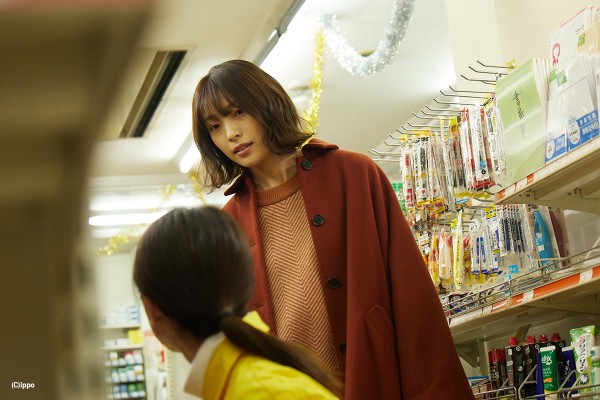
https://psychocinematography.com/202...iew-oaff-2023/
Subtle picture of a young woman pulling away from societal pressure
This little film, Ishibashi's second feature, patiently explores the world of Nozomi Iizuka (Erika Karata of Asako I & II), a 24-year-old single woman in present-day Japan finding. her lonely way a bit outside conventional expectations. She has quit her company job and works part time at a kombini, a Yamazaki chain convenience store. Six months go by before she dares to call and tell her mother or this. She lives by herself in another town. The breakthrough is becoming friends with a junior high classmate, Kanako (Haruka Imou). She works too, but they find each other thanks to Iizuka's willingness to fill in on the night shift at the store.
Yuho Ishibashi's strength as a director is her sensitivity to the delicate unfolding of these two women to each other through their traditional Japanese shyness, the minimalism of Japanese speech. Sadly, the below-par English subtitles are not up to the job of conveying these subtleties. Luckily actions speak for themselves when Iizuka is clerking at the store, getting drunk with friends, being guided home by a cute younger male fellow employee she fancies, and later by Kanako. Kanako needs Iizuka. She says she can't connect with her former classmates. The two young women go bowling, and Iizuka is terrible: but it doesn't matter because it's the sharing that counts. Iiuka stays overnight with Kanako at her grandparents' house where she lives. It's almost a two-girl pajama party years after the age when either young women did such a thing - but we feel how they need it and benefit from it.
Iizuka's gradually developed closeness with Konoko, the time spent, the sharing about her discomfort at the company job and alienation from parents through quitting it, finally gives Iizuka the strength to call her mom and "confess." The positive slant of the film comes in her mother's gentle reception of this news: she is glad Iizuka hasn't had a child or gotten involved with a religious cult. She reassuringly tells Iizuka "You did your best," and reminds her that most of her life is still ahead of her. She promises to break the news to Iizua's father gently. A big moment in the film, simple and decisive; a sort of climax, though what has come before is more important and much more complicated.
This is a patient film, process-oriented and almost transactional. It takes a little more time, even with waking up and getting out of bed, eating breakfast, sipping ramen in the evening. Even the drunken scenes are handled tastefully. The scenes between Erika Karata and Haruka Imou are fine. It doesn't hurt that both actresses are beautiful, especially Karata, which makes everything feel more universal. This film, which has a touch of Ozu and Koreeda, is a wonder of delicacy - which good subtitles would have enabled the Anglophone viewer to appreciate further.
The soft guitar and keyboard score is appropriate but underlines a certain blandness. The film leaves questions unanswered, possibilities unexplored. As her mother says, Iizuka's life is more than half ahead of her. But what about the immediate future? Will things with the young male coworker develop? Is Iizuka going to be a convenience store clerk forever, or go back to school, like Kanako? Is this a solution or an escape? Just how shitty was her company job? Maybe we don't realize how stifling social pressures are in Japan, and this is a hint of that.
When Morning Comes, I FeelEmpty, 朝がくるとむなしくなる, 74 mins. International premiere at Japan Cuts, Japan Society, NYC Thursday, August 3, 2023, 6:00 pm.
Last edited by Chris Knipp; 07-31-2023 at 11:28 PM.
-
FROM THE END OF THE WORLD 世界の終わりから ( Kazuaki Kiriya 2023)
KAZUAKI KIRIYA: FROM THE END OF THE WORLD 世界の終わりから (2023)
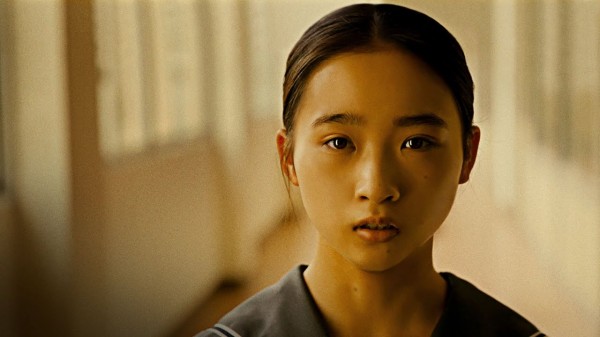
AOI ITO IN FROM THE END OF THE WORLD
A girl's dreams called upon to save the world
This is another one of those films about the apocalypse - and hoping to manage at the last moment to avoid it. It's a lot of pretty images and, to signify leaps between dream and reality, rapid shifts from color to black and white - a device becoming very familiar lately, used even in the great new Christopher Nolan film, Oppenheimer. There's a succession of well-differentiated characters, a plus. They all revolve around a teen protagonist: a mild high school senior called Hana (Aoi Ito). She lost her parents some time ago. But she has various companions and protectors, especially since it's emerged that she alone, through her dreams, can prevent the world - especially Japan's corner of it - from coming to an end. There are also resentful and hateful people who misunderstand her and wish for her demise.
Actually, to be honest, this isn't convincingly the end of or salvation of anything. But according to his statements, it is promised to be director and former music video wunderkind Kazuaki Kiriya's last feature film. James Hadfield in his Japan Times review of this work runs through the director's 2000's oeuvres and finds them underwhelming, none more than this one. He deems retirement advisable.
But back to the new film. Why we don't know, but just as Hana has lost her last remaining relative, she is visited by government agents terribly interested in her dreams. We plunge into one of those, in black and white, taking us to perhaps 16th-century Japan and warring samurai, who almost kill Hana. Escaping, she meets an elegant, high-coiffed mystic lady (Mari Natsuki) who becomes her mentor and sends her on a quest with young, small Yuki (Mio Matsuda) as her guide. Back in the real world (and color) Hana sees the lady again, her robe now a deep, satisfying crimson. Her person and her garment bring class to this movie. The lady gives Hana more explanations of the impending end of the world and her ability to stop it. She pages through ancient-looking books in strange hieratic script that recount everyone's life, past, present, and future, and explains that the lives of everyone living all end in two weeks. These books (along with the lady's crimson robe and her makeup and tall mound of hair like a crown) are my favorite props of the film, for their script, somewhere between cuneiform and braille, and the mystic lady runs her fingers over them in a satisfyingly tactile way.
There is a high official in the Japanese government who strenuously objects (as well he might) to having a 17-year-old girl put in charge of the fate of things, and on the basis of dreams. (If the film had taken note of its own absurdity, it might have had something.)
Hadfield, to illustrate his lack of admiration for this movie, mentions Netflix movies, a game, and an anime series he thinks Kiriya's film is all too similar to. I am not familiar with those. But From the End of the World, while Kiriya's film is handsome, especially when Mari Natsuki is on the screen in that deep crimson dress, and the staging of scenes is also good looking, it is otherwise neither original nor all that exciting. It's especially troubling that such a beautiful "look" is achieved, but the screenplay fails to clarify basic details. Why and how is the world coming to an end? Just how is Hana's dreaming supposed to arrest this turn of events?
Hadfield provides some technical comments: the director departs from green screen and the backlot and shoots, often handheld and wide-angle by Chigi Kanbe (he's reminded of Sam Raimi), on location. He suggests that budgetary restraints serve in the film's favor here, "giving it an endearing DIY energy," though - I'd strongly agree - the 135-minute run time makes the movie feel "stretched thin." Compare Chris Marker's 28-minute Le jetée.
At the end, people start dying or getting killed, with a lot of weepy closeups, and this is an element that feels particularly cloying. Refrained is better, and much the Japanese style. But the point is Hana, debating with others, decides people are too much of a mess and it's best that the world should end. There's a rather nice final scene of a far-in-the-future person digging up a time capsule containing a cassette tape with Hana's statement about this, and her wish that the later world has turned out to be better than hers was. Again, stoicism would have put across the idea much better.
From the End of the World 世界の終わりから, 135 mins., released in Japan Apr. 7, 2023. IT was screened for this review as part of Japan Cuts 2023., where it will be presented:
Saturday, August 5, 2023
9:30 pm
Last edited by Chris Knipp; 09-06-2023 at 01:07 AM.
 Posting Permissions
Posting Permissions
- You may not post new threads
- You may not post replies
- You may not post attachments
- You may not edit your posts
-
Forum Rules





 Reply With Quote
Reply With Quote






Bookmarks